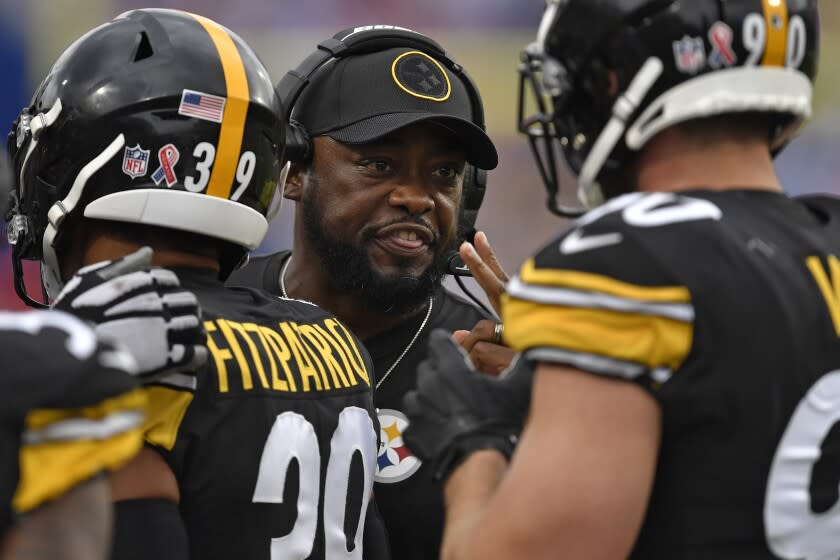Granderson: The NFL fails on Black leadership. So do most institutions in America

- Oops!Something went wrong.Please try again later.
There are three things in life in this country you can always depend on: death, taxes and sports journalists admonishing the NFL for its lack of Black head coaches.
With the Houston Texans firing David Culley after just one season, the league is now down to a single Black head coach, the Pittsburgh Steelers' Mike Tomlin. And while Tomlin, who has never had a losing season in 15 seasons and was the youngest head coach to win a Super Bowl, is probably sick of being asked to comment on something he has absolutely no control over, he typically doesn’t hold back on the situation when asked.
During a segment on HBO’s “Real Sports With Bryant Gumbel” in February 2021, he told Gumbel, "We just can’t continue to do the same things that we’ve done and think that the outcome is going to change."
And that was when there were three Black coaches in the league.
But there’s an aspect to this conversation that is often overlooked when it comes to this annual critique of the NFL’s hiring practices: There are not a lot of areas of American life that have been much different.
In August, ESPN reported that after Dennis Green became the first Black head coach of a Power 5 conference football program in 1981, only 39 Black coaches had been hired by a Power 5 school since. In fact more than half of those schools have never had a Black head football coach period, including the two programs that played in Monday’s national championship game, Georgia and Alabama. Georgia did hire a Black athletic director once in 2004. That’s it. And that's still one up on Alabama, which reportedly was one of 24 Power 5 schools to have never hired a Black head coach or athletic director.
But it’s not just football.
In the same month the conversation between Gumbel and Tomlin aired, Fortune noted since it began publishing its Fortune 500 list in 1955, just 19 of the 1,800 CEOs featured were Black. In 93 years, just six Black men have received Oscar nominations for best director and none has won. When Kevin Merida was hired in June, he became just the second African American to lead the Los Angeles Times in its 140-year history. Hell, since the U.S. Senate first convened in 1789, there have been only 11 Black senators.
So I guess we could spend this time repeating the same tired discussions about the NFL’s shortcomings and the racism tied to it. Or we could look at this topic with a panoramic lens: Black leadership is scarce everywhere.
This is not an attempt to give the NFL cover. It has earned the scorn.
But NFL teams are owned by NFL owners who spend a great deal of time interacting with other business leaders. They are cognizant of who is in the room making decisions and more importantly, who is not. You don’t think they’ve noticed how few Black CEOs there have been over the half century of Fortune 500 lists? Time and time again we expect a league that infamously resisted Black leadership at the quarterback position for decades, to be somewhere corporate America, Hollywood and the so-called liberal media are not.
In September, Richard Lapchick, a contributor to ESPN, noted that the Sports Media Racial and Gender Report Card found that the industry that likes to ridicule the NFL for having overwhelmingly white and male leaders remains overwhelmingly white and male itself.
Insert pot and kettle joke here.
When I brought this up to my husband, a retail executive who has been in the industry for more than 30 years across six companies, he told me he has never had a Black boss. I’ve had less than a handful myself. How about you?
This NFL head coaching conversation is one we can have about many industries and fields in this country. It is not about a lack of qualified candidates.
It’s not simply about tweaking the Rooney Rule or updating human resources policies. And it damn sure isn’t happenstance. This is about the sensibilities of a country that greeted its first Black president with a "birther" movement led by a reality TV star whose conspiracy theories about the first Black president were legitimized by news outlets and like-minded elected officials.
In fact, the only person in that whole ordeal who was forced to show proof of anything was the Black president.
Why this all came to be is the real conversation we need to be having, instead of cherry picking quotes from the Rev. Martin Luther King Jr., which might make some people feel good. Because it’s not just the NFL that has a problem valuing Black leadership.
It’s America.
This story originally appeared in Los Angeles Times.

